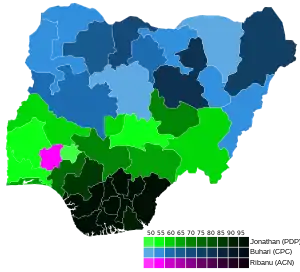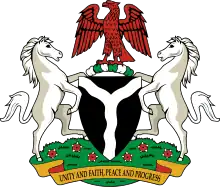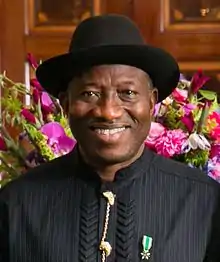2011 Nigerian presidential election
Presidential elections were held in Nigeria on 16 April 2011, postponed from 9 April 2011.[3][4][5] The election followed controversy as to whether a northerner or southerner should be allowed to become president given the tradition of rotating the top office between the north and the south after the death of Umaru Yar'Adua, a northerner, when Goodluck Jonathan, another southerner assumed the interim presidency.
| |||||||||||||||||||||||||||||
73,528,040 registered voters[1] 25% in each of 2/3 States + Majority[2] votes needed to win | |||||||||||||||||||||||||||||
|---|---|---|---|---|---|---|---|---|---|---|---|---|---|---|---|---|---|---|---|---|---|---|---|---|---|---|---|---|---|
| Turnout | 53.68%[1] | ||||||||||||||||||||||||||||
| |||||||||||||||||||||||||||||
 States won by Jonathan (in green), Buhari (blue), and Ribadu (purple) | |||||||||||||||||||||||||||||
| |||||||||||||||||||||||||||||
 |
|---|
|
|
Immediately after the election widespread violence erupted in the northern, Muslim parts of the country.[6] Jonathan was declared the winner on 19 April.[7] However, international observers declared the election to be "orderly, free and fair" in the entire southern half of the country.[8]
Background
According to a gentlemen's agreement within the ruling Peoples Democratic Party (PDP) power is to rotate between the predominantly Muslim north and Christian south every two terms; this meant the flag bearer of the party for the 2011 election was scheduled to be represented by a Northerner.[9][10] After the death of one term President Umar Yar'Adua, a Northern Muslim, his Vice President Goodluck Jonathan, a Southern Christian, took over as acting president. The suggestion that Jonathan was considering running for the presidency in his own right was controversial as Yar'Adua had only served one of the two possible terms as president after Southerner Olusegun Obasanjo.[11]
Candidates
Due to the zoning system, a Northern Muslim candidate, Ibrahim Babangida, a former general and military ruler, and Atiku Abubakar, a former vice president, ran for the presidency. After initial doubts,[9] the interim president Goodluck Jonathan declared his intention to run for the presidency on 18 September 2010.[12] Muhammadu Buhari was seen as the principal opposition to Jonathan besides Nuhu Ribadu.[13]
In 2011, sixty-three political parties were registered in Nigeria[14] Online newspaper Naija Gist reported that twenty-one parties were fielding candidates, but listed only 19. Only one woman, Ebiti Ndok, was running.[15]
| Political parties | Presidential candidates | Running mates |
|---|---|---|
| ACN | Nuhu Ribadu[16] | Fola Adeola[15] |
| ADC | Peter Nwangwu[15] | Mani Ibrahim Ahmad[15] |
| ANPP | Ibrahim Shekarau[17] | John Odigie Oyegun[15] |
| AFP | Yahaya Ndu[15] | |
| BNPP | Iheanyichukwu Nnaji[15] | Kadijat Abubakar[15] |
| CPC | Muhammadu Buhari[18] | Tunde Bakare[15] |
| FDP | Chris Okotie[15] | |
| HDP | Ambrose Awuru[15] | Ibrahim Abdullahi[15] |
| LDP | Chris Nwaokobia[15] | |
| NCP | Dele Momodu[15] | Yunusa Tanko[15] |
| NMDP | Akpona Solomon[15] | - |
| NTP | John Dara[15] | - |
| MPPP | Rasheed Shitta-Bey[15] | - |
| PDC | Mahmud Waziri[15] | Clement Eze[15] |
| PDP | Goodluck Jonathan[19] | Namadi Sambo[15] |
| PMP | Nwadike Chikezie[15] | - |
| SDMP | Patrick Utomi[15] | Lawal Funtua[15] |
| UNPD | Ebiti Ndok[15] | Galadima Samari[15] |
| Ibrahim Babangida[20] |
Campaign
Following a bombing in Abuja during Nigeria's 50th anniversary of Independence celebrations and the arrest and interrogation of the Director General of Babangida campaign, Raymond Dokpesi, there were calls for him to quit the race. In addition, others who linked his affiliates to the blasts. He responded in saying it would be "idiotic to link" him with attack. Even before the blasts, however, some of his former loyalists, popularly called "IBB Boys," apparently asked him to quit the presidential race to avoid being rubbished by a non-General.[21][22]
Controversy
- Postponement
In September 2010, the election commission requested a postponement of the polls citing the need for more time to overhaul the national electoral register. Critics were upset over the proposal.[23] The election was postponed from January to April 2011 due to the release of a new electronic voter registration software.[4]
- Pre-election violence
In December 2010, bombs went off in Yenegoa, Bayelsa State during a gubernatorial campaign rally. Politicians and police said that the campaign of violence aimed to disrupt the election.[24] There had been bombings and shootings in the north blamed on Boko Haram since 2009, intensifying during 2010. On 1 October 2010, the "Movement for the Emancipation of the Niger Delta", a militant group, claimed responsibility for dual car bombings during Nigeria's 50th independence anniversary celebrations in the capital that had killed at least 12. On Christmas Eve, 24 December 2010 a series of bombs went off in villages near Jos, the main city of the Plateau state, killing 32 people and leaving 74 others in critical condition, and on 31 December 2010 a bomb exploded in an open-air beer garden and market at army barracks in Abuja, killing at least four and wounding at least 21.[25]
Results
The elections was reported in the international media as having run smoothly with relatively little violence or voter fraud in contrast to previous elections, in particular the widely disputed 2007 election. Indeed, at least one observer pronounced them the most smoothly run elections held since the restoration of democracy 12 years earlier.[19]
The United States State Department said the election was "successful" and a "substantial improvement" over 2007, although it added that vote rigging and fraud also took place.[26] The Guardian also noted that irregularities, such as underage voting and snatching of ballot boxes were reported.[27] Buhari claimed that his supporters in the south were not allowed to vote.[28]
| Candidate | Party | Votes | % | |
|---|---|---|---|---|
| Goodluck Jonathan | People's Democratic Party | 22,495,187 | 58.87 | |
| Muhammadu Buhari | Congress for Progressive Change | 12,214,853 | 31.97 | |
| Nuhu Ribadu | Action Congress of Nigeria | 2,079,151 | 5.44 | |
| Ibrahim Shekarau | All Nigeria Peoples Party | 917,012 | 2.40 | |
| Mahmud Waziri | People for Democratic Change | 82,243 | 0.22 | |
| Nwadike Chikezie | Peoples Mandate Party | 56,248 | 0.15 | |
| Lawson Igboanugo Aroh | Peoples Progressive Party | 54,203 | 0.14 | |
| Peter Nwangwu | African Democratic Congress | 51,682 | 0.14 | |
| Iheanyichukwu Nnaji | Better Nigeria Progressive Party | 47,272 | 0.12 | |
| Chris Okotie | Fresh Democratic Party | 34,331 | 0.09 | |
| Dele Momodu | National Conscience Party | 26,376 | 0.07 | |
| Akpona Solomon | National Majority Democratic Party | 25,938 | 0.07 | |
| Lawrence Makinde Adedoyin | African Political System | 23,740 | 0.06 | |
| Ebiti Ndok | United National Party for Development | 21,203 | 0.06 | |
| John Dara | National Transformation Party | 19,744 | 0.05 | |
| Rasheed Shitta-Bey | Mega Progressive Peoples Party | 16,492 | 0.04 | |
| Yahaya Ndu | African Renaissance Party | 12,264 | 0.03 | |
| Ambrose Awuru | Hope Democratic Party | 12,023 | 0.03 | |
| Patrick Utomi | Social Democratic Mega Party | 11,544 | 0.03 | |
| Chris Nwaokobia | Liberal Democratic Party of Nigeria | 8,472 | 0.02 | |
| Total | 38,209,978 | 100.00 | ||
| Valid votes | 38,209,978 | 96.81 | ||
| Invalid/blank votes | 1,259,506 | 3.19 | ||
| Total votes | 39,469,484 | 100.00 | ||
| Registered voters/turnout | 73,528,040 | 53.68 | ||
| Source: INEC | ||||
Post-election violence
The election sparked riots in Northern Nigeria. According to Human Rights Watch about 140 were killed in political violence before the election alone, between November 2010 until 17 April 2011, the day after the election. According to the head of a leading Nigerian civil rights group living in Kaduna, more than 500 mostly Muslim people had been killed in three villages just in Kaduna since 16 April 2011. A speaker for the "Open Society Justice Initiative" stated the only comparable episodes of violence occurred in the mid-1960s and early 1980s, which both led to government overthrow. Buhari had refused to condemn possible violent reaction to the election result, which has been interpreted as an invitation to his supporters to riot. Up to 1,000 people could have died in post-election violence.[29]
Further reading
- John A. Ayoade, and Adeoye A. Akinsanya, eds. Nigeria's Critical Election, 2011 (Lexington Books; 2012)
References
- "Voter turnout data for Nigeria". International IDEA. International Institute for Democracy and Electoral Assistance. Archived from the original on 5 May 2015. Retrieved 28 April 2015.
- "Approved Guidelines and Regulations for the Conduct of 2015 General Elections" (PDF). Abuja: Independent National Electoral Commission. January 2015. Archived from the original (PDF) on 21 January 2015. Retrieved 21 January 2015.
- "Nigeria to hold presidential election on 9 April". BBC News. 23 November 2010.
- Nigeria’s General Elections Postponed From January To April As A New Voter Registration Software Is Released By The Inec All West Africa News Archived 2 December 2010 at the Wayback Machine
- "Nigeria Elections postponed for second time". Aljazeera News. 3 April 2011.
- "Jonathan rival rejects vote result as thousands flee Nigeria unrest". Daily Nation. Kenya. 20 April 2011. Retrieved 21 April 2011.
- Purefoy, Christian (19 April 2011). "Widespread election violence erupts in Nigeria". CNN. Retrieved 20 April 2011.
- "Jonathan rival rejects vote result as thousands flee Nigeria unrest". 3 July 2020.
- Nigeria sets presidential poll date Al Jazeera English, 7 September 2010
- Toyin Falola; Matthew M. Heaton (24 April 2008). A History of Nigeria. Cambridge University Press. p. 277. ISBN 978-1-139-47203-6.
- Maja-Pearce, Adewale (16 August 2010). "Nigeria's 2011 presidential race tests North-South powersharing agreement". Christian Science Monitor. Retrieved 17 April 2011.
- Jonathan declares Nigeria poll bid Al Jazeera English, 18 September 2010
- "Breaking News, World News and Video from al Jazeera". english.aljazeera.net. Archived from the original on 13 April 2011.
- The Nigerian Voice| BATTLE OVER 'MEGA' TEARS TWO PARTIES APART 14 October 2010
- Ndujihe, Clifford (n.d.). "Nigeria Presidential Candidate List for 2011 and Their Empty Promises". Naija Gist. Retrieved 17 April 2011.
- "Nigerian President Goodluck Jonathan to seek one term". BBC News. 1 February 2011.
- "Nigeria 2011 Presidential Candidates". Indepth Africa. Retrieved 17 April 2011.
- "Nigeria ex-military ruler picked for presidency bid". Reuters. 5 January 2011. Archived from the original on 8 January 2011.
- Nossiter, Adam (16 April 2011). "Nigerians Vote in Presidential Election". The New York Times. Retrieved 17 April 2011.
- Adisa, Taiwo (9 October 2010). "Abuja Bomb Blasts: Odds Against IBB". The Tribune. Archived from the original on 14 November 2010. Retrieved 17 April 2011.
- Abuja Bomb Blasts: Odds Against IBB Archived 14 November 2010 at the Wayback Machine
- A.A, Ujo (2000). Understanding elections. Anyaotu Enterprises and Publisher.
- Plea to postpone Nigeria poll Al Jazeera English, 21 September 2010
- "Bombs, shootings hit Nigeria before election year". Reuters. 29 December 2010. Archived from the original on 1 January 2011.
- "Timeline: Tensions in Nigeria". Al Jazeera. 26 December 2010. Retrieved 8 February 2015.
- Johnnie Carson (28 April 2011). "The Recent Elections in Nigeria". Department of State, Bureau of African Affairs.
- Smith, David (17 April 2011). "Goodluck Jonathan opens unassailable lead in Nigeria's presidential election". The Guardian. London.
- "Opposition claims irregularities in Nigeria's presidential election". france24.com. 20 April 2011.
- Nossiter, Adam (24 April 2011). "Election Result Fuels Deadly Clashes in Nigeria". The New York Times.

.jpg.webp)
